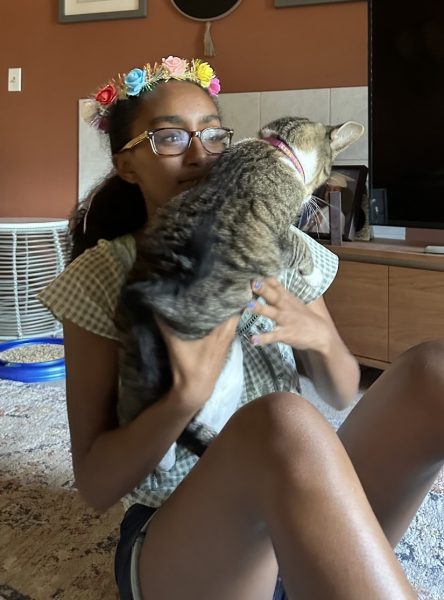When imagining the life of Elvis Presley, it’s easy to conjure up exciting days filled with never-ending parties and trips. It might then come as a shock that the movie Priscilla, depicting the life of Elvis’ eponymous wife, frequently interrupts its own upbeat montages with scenes of quiet, tense dialogue between the couple. This is because the movie aims to peel back the image of Priscilla’s seemingly luxurious life at Elvis’ side, revealing the intense manipulation and abuse he exercised against her. While Priscilla depicts this relationship in a haunting yet enlightening manner, it seems to lose the nuance of Priscilla’s personal struggle and growth along the way.
Priscilla first opens in Bad Nauheim, Germany, 1959, as Priscilla and Elvis unknowingly live alongside each other when both Priscilla’s father and Elvis are stationed there. Priscilla is invited to a house party and immediately noticed by Elvis, to the dismay of her parents — Priscilla is 14, and Elvis is 24. She’s only allowed to move in with him in the U.S. when she’s 17. Her life changes rapidly as she becomes known as Elvis’ partner, especially as she grows more isolated and confined. The pair quickly get married as they continue to grapple with problems such as Elvis’ growing drug addiction, infidelity, and violence toward her. The movie culminates when Priscilla, along with their daughter Lisa, leave Elvis.
The movie tells a heartbreaking story of manipulation using so many subtle tools. Priscilla displays how Elvis brings Priscilla’s life to a standstill. One of the more obvious displays of this is in the motif first mentioned in this article’s introduction, where the movie often cuts away from its upbeat montages to show slow scenes of dialogue and long shots of objects around the house. The movie aims to peel back the image of Priscilla’s seemingly luxurious life at Elvis’ side, revealing the intense manipulation and abuse he exercised against her.
We are also shown how Priscilla slowly melts into Elvis’ world through her fashion throughout the movie: one detail throughout is that Priscilla is often dressed in white while Elvis wears darker colors. Some examples are her white nightgown against his navy pajamas and her white graduation gown against his black suit (as she was graduating high school years into her relationship with him). However, toward the end of the movie, Priscilla changes into a matching black nightgown. She also starts replicating Elvis’ habit of not saying “I love/miss you” back when on the phone.
Fashion is utilized in so many ways in Priscilla. While Priscilla starts the film off in simpler clothes, she opts for more extravagant outfits as the movie goes on. Her shift in style is tailored to make her look more dressed up and doll-like, showing how she’s starting to become more and more like part of the decoration that surrounds her in Elvis’ lavish home. We get many silent scenes of Priscilla in the house alone, standing in the center of the frame, looking at the decorations around her. There are different variations of this, like when she’s painting her nails as an advertisement plays in the background, or when there’s an eerily long shot of her standing behind a window, longingly looking outside. This makes her last shot in the home after she’s left Elvis, looking around before walking out of frame, even more poignant. It’s a shame we didn’t get to see more of her unique personality and goals in the film.
While Priscilla tells its story beautifully, I started to feel a bit detached from the story as the movie went on. Specifically, I wasn’t attached to Priscilla; there wasn’t much personality or personal growth of hers for me to follow.
One standout cause for this is the movie’s narrative structure: it starts right when Priscilla is first swept into Elvis’ world, and ends as soon as she leaves it. This allows for no time to get attached to who she is outside of her relationship with Elvis. The movie is only an hour and 40 minutes (an impressively short length for this new surge of biopics), so some more time for us to learn about Priscilla as a person would be helpful to get invested in her story.
Priscilla also doesn’t feel like a complete character because she has no developed relationships outside of hers with Elvis. The film tries to pull off two emotional goodbyes — one between Priscilla and her parents at the beginning of the movie and one with Elvis’s housekeepers towards the end — but neither land. Priscillla features bland dialogue for everyone outside of Priscilla and Elvis, especially from her parents. Elvis’ manipulation of them is well portrayed, but we never get to see why her parents caved by letting her go with Elvis from their perspective. As for the housekeepers, Priscilla rarely has any interaction with them outside of a few quiet greetings. While this absence of outside relationships does add onto the idea of Priscilla’s growing isolation, we never get to see any of her other relationships degrade or develop at all, leading to a crucial lack of personality and nuance.
In the end, Priscilla is a movie that tells the story of an abusive relationship happening behind closed doors. It’s extremely important topics like these are handled with care, which this film accomplishes beautifully. However, there’s more to the real story; for one, the titular Priscilla went on to lead her own successful acting career after leaving Elvis Presley. It’s a shame we didn’t get to see more of her unique personality and goals in the film.


